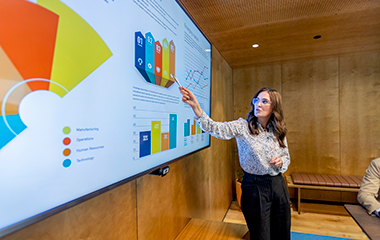Frequently Asked Questions

CBC grew from a collaboration between DFPS and private providers who were seeking to find innovative ways to serve children and families – one that focuses on the best interest of children and families. This coincided with a shift toward performance-based contracting where contracts focus less on prescribing service requirements and give providers the flexibility to achieve outcomes.
In 2017, Texas Legislature directed DFPS to contract with community-based nonprofit and local governmental entities that can provide child protection services. These services must include direct case management to ensure child safety, permanency, and well-being in accordance with state and federal child protection goals. Senate Bill 11 codified Community-Based Care in Texas Family Code, section 264.151, section B-1. The intent of the legislation is not to change the work done by caseworkers, but to shift from a state-run child protection system to a community-based system with more flexibility to develop services that reflect the local community and its needs.
Community-Based Care is expanding to a few community areas at a time. A community area can be a single urban county or a group of counties. In each area, DFPS is implementing Community-Based Care in three stages:
- In Stage I, a single CBC contractor in a community area (Single Source Continuum Contractor or SSCC) develops a network of services and provides foster care placement services. The focus in Stage I is improving the overall safety and well-being of children in paid foster care, keeping them closer to home and connected to their communities and families. The SSCC is responsible for the children in paid foster care and those entering paid foster care.
- In Stage II, the SSCC continues all Stage I services and begins providing case management, kinship, and reunification services. The focus of Stage II is expanding the continuum of services to include serving all children in DFPS conservatorship and their families, as well as increase the number of children and youth who find permanent homes. The length of the transition from Stage I to Stage II is based on DFPS and SSCC readiness, but DFPS anticipates that Stage I will last approximately 18 months from the day the contract is signed. This includes a six-month start-up period before the SSCC begins placing children.
- In Stage III, DFPS begins to hold the SSCC accountable using financial incentives and remedies for the timely achievement of permanency. In most cases, Stage III will begin 18 months after the SSCC begins serving all children and families in each community.
DFPS regions were subdivided into 16 community areas. DFPS’s statewide implementation plan is guiding this transition and the proposed areas were selected with the input of stakeholders and consultants, based on the following criteria:
- Minimum of 500 new children entering care per year
- Proximity to existing service areas
- Local community support
- Regional readiness and stability
- Placements in and out of the service area
- Challenges with capacity
- Affordability
DFPS will continue to test these criteria as it implements Community-Based Care in communities across the state. For example, there may be other factors that outweigh the need for 500 new entries.
The Texas Family Code §264.157(c) requires DFPS to accept and evaluate unsolicited proposals from Texas-based entities for areas not already covered by CBC. Since the law allows DFPS to implement unsolicited proposals, this could affect the number of individual CBC community areas in Texas.
Learn more about CBC community areas.
Single Source Continuum Contractors (SSCCs) must accept all children for placement in foster care from their community area (No Eject) and cannot expel any child (in their community area) due to behaviors, mental health, etc. (No Reject).
DFPS and each SSCC are committed to improving outcomes for children, youth, and families. Most SSCCs have been working in their respective communities for years. Some were serving children and families in their communities before Child Protective Services existed. A key role of each SSCC is to maximize the contribution of all community partners to meet the needs of local children and families. The SSCCs recognize that this means harnessing the knowledge and experience of individuals who have made a career in child protection, whether in the public or private sector.
A key feature in CBC is the Single-Source Continuum Contractor, or lead contractor, that is responsible for all care and services in a given area. That lead agency is regularly evaluated by DFPS through contract provisions and performance measures.
SSCCs are held accountable for certain contract requirements and performance measures. Keeping siblings placed together is a performance measure and maintaining sibling contact while in care is a contract requirement. Each SSCC is monitored by DFPS on a quarterly basis to ensure contract requirements are being met and performance measures are meeting or exceeding the established baseline. In Stage II CBC, DFPS will add case management oversight to the SSCC quarterly monitoring.
Placement and Provider Questions
During stage readiness periods, DFPS, the SSCC, and the Office of Community-Based Care Transition (OBCT) collaborate in educating foster families about the transition so that it is as seamless as possible for them.
In a series of provider and one-on-one meetings, DFPS meets with caregivers/foster parents through regular case management and other community meetings to share information about CBC. Communication with providers and foster families is planned and strategic to ensure they have timely information.
E&T providers are not affected during CBC Stage I. However, in Stage II, each SSCC must build a network of family service providers inside and outside of its community area. Providers are encouraged to contact the new SSCC in their community area to discuss working as a sub-contractor.
Kinship/Foster Caregiver Questions
Our goal is to continue providing consistent services to children in the area.
Yes, the providers you rely on will continue to serve the child. If a contractor were to not contract with the SSCC, they would still see through any active referrals and services to children and families.
Children and youth will have the same healthcare coverage, which is provided by Superior Healthcare.
The goal is to transition as many DFPS staff as possible to the SSCC in each of the community areas as part of the transition process. When possible, staff are encouraged to complete a transfer visit with families and caregivers from the current caseworker to the new caseworker.
The DFPS Office of Consumer Affairs will continue to take complaints. To make a complaint directly to an SSCC, see the list of contacts below:
- OCOK: consumeraffairs@oc-ok.org
- Belong: consumeraffairs@sjrctexas.org
- 2Ingage: concernline@tfifamily.org
- Saint Francis: customer.care@st-francis.org
Biological Parent Questions
DFPS is working with the Single Source Continuum Contractor (SSCC) to ensure a transition that is as seamless as possible. Before the transition, the SSCC must provide a readiness plan that specifies how services will be provided. This will help your case stay on track.
DFPS works with the SSCC to ensure a transition that is as seamless as possible. Your case will transition to the SSCC on day one of Stage II. During a readiness period, the SSCC secures contracts with existing and willing service providers to ensure continuity of services to children and families with little to no disruption in their case progress. Any service provider unwilling or unable to contract with the SSCC will continue to serve the family to complete the services initiated by the CPS caseworker. The SSCC can then transition the family to a new service provider in their network if ongoing services for the same item are needed in the future.
Contact your caseworker to arrange visits.
Foster Children and Youth Questions
Your caseworker will always be a phone call away and will visit you on a regular basis. They will have a new job title (permanency specialist) and a different employer, but the service you receive will be the same.
In addition, you can contact the Texas Abuse and Neglect Hotline to make a report.
You can contact the Foster Care Ombudsman to make a complaint about your case, ask questions, understand your rights, and find resources to help you be successful when you leave foster care.
Contact the Texas Abuse Hotline to report abuse, neglect, or exploitation at 800-252-5400 or make a report online.
Contact the Foster Care Ombudsman to make a complaint about your case, ask questions, understand your rights, and find resources to help you be successful when you leave foster care.
Your caseworker is not expected to change, but sometimes that can happen. If so, you will receive the name and contact information for your new caseworker. They will have a new job title (permanency specialist) and a different employer.
Your caseworker will arrange visits for you..
No, the rules for where you currently live are not expected to change.
Your caseworker is always a phone call away.
Learn More

Community-Based Care News

Community-Based Care Reports
